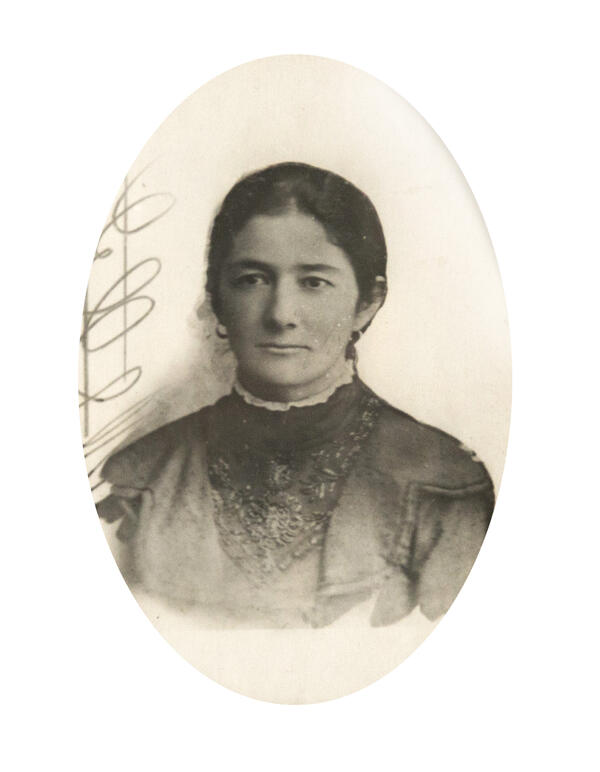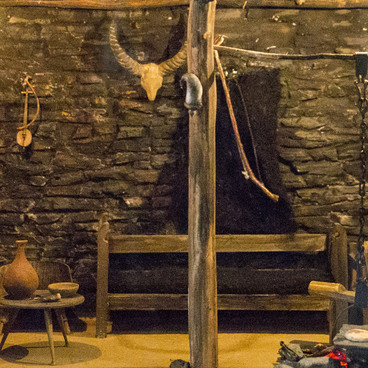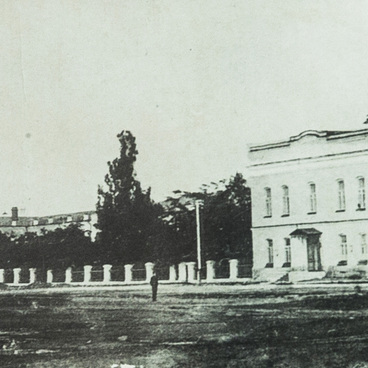Rahe (Rakhil) Mamieva-Khetagurova was the wife of Nikolai (Niko) Pavlovich, uncle of the poet Kosta Khetagurov. While living in Azerbaijan, Rahe learned Russian. Her contemporaries considered her to be an intelligent and literate woman.
Author of the book ‘Kosta Khetagurov and His Time’ Vladimir Abaev wrote: ‘We surrounded the poet [Khetagurov] in a tight circle and escorted him all the way to the house, where his relative Rahe Khetagurova, a well-respected woman, the mother of two daughters, Nina and Varya, lived. Rahe lived here near Vrevskaya Street, in the Mamulov’s house, renting a wing with an entrance facing the street. Here, at the entrance, Kosta warmly parted from us and entered the house’.
Niko and Rahe Khetagurov had five children: Pyotr, Boris, Nina, Varya, and Alexandra. At the age of 30, Rahe became a widow. She had to raise her children on a pension of twenty rubles. These payments were made out to her by the Siemens plant, where Niko worked all his life. Mamieva-Khetagurova overcame many hardships and difficulties, but did everything to give all of her children a decent education.
In the summer of 1903, Kosta Khetagurov fell seriously ill. The nervous disorder that plagued the poet for many years worsened. The family of Rahe Khetagurova took Kosta into their home, but he soon asked to be taken to his father’s house in the village of Georgiyevsko-Osetinskoye.
Nina, the daughter of Rahe and Niko, left many memories about Kosta. She wrote: ‘When in Vladikavkaz, Kosta came to visit us almost every day: in a gray chokha, a small black hat with a hood, boots with small heels, always polished, shiny, and with a walking stick, slightly limping. We would greet him with joy, but if we ran out with messy hair, he would invariably say to my mother, “Aeri-ma, Rahe haersgard” [“Rahe, give me a pair of scissors"]. Afraid that we would get a haircut, we would crawl under the bed, smoothing our hair with our palms. Kosta would scold the boys for their mischief and poor schoolwork, especially the younger Boris, who was known for being naughty. At one point, Kosta lived on Tserkovnaya Street [now called Dimitrova Street] in a small room on the second floor. My sister and I ran to him on various errands from mother, who served him all the time, and brought him underwear, lunch, and breakfast. Kosta’s easel was by the window, and he always worked in a blue smock.’
Author of the book ‘Kosta Khetagurov and His Time’ Vladimir Abaev wrote: ‘We surrounded the poet [Khetagurov] in a tight circle and escorted him all the way to the house, where his relative Rahe Khetagurova, a well-respected woman, the mother of two daughters, Nina and Varya, lived. Rahe lived here near Vrevskaya Street, in the Mamulov’s house, renting a wing with an entrance facing the street. Here, at the entrance, Kosta warmly parted from us and entered the house’.
Niko and Rahe Khetagurov had five children: Pyotr, Boris, Nina, Varya, and Alexandra. At the age of 30, Rahe became a widow. She had to raise her children on a pension of twenty rubles. These payments were made out to her by the Siemens plant, where Niko worked all his life. Mamieva-Khetagurova overcame many hardships and difficulties, but did everything to give all of her children a decent education.
In the summer of 1903, Kosta Khetagurov fell seriously ill. The nervous disorder that plagued the poet for many years worsened. The family of Rahe Khetagurova took Kosta into their home, but he soon asked to be taken to his father’s house in the village of Georgiyevsko-Osetinskoye.
Nina, the daughter of Rahe and Niko, left many memories about Kosta. She wrote: ‘When in Vladikavkaz, Kosta came to visit us almost every day: in a gray chokha, a small black hat with a hood, boots with small heels, always polished, shiny, and with a walking stick, slightly limping. We would greet him with joy, but if we ran out with messy hair, he would invariably say to my mother, “Aeri-ma, Rahe haersgard” [“Rahe, give me a pair of scissors"]. Afraid that we would get a haircut, we would crawl under the bed, smoothing our hair with our palms. Kosta would scold the boys for their mischief and poor schoolwork, especially the younger Boris, who was known for being naughty. At one point, Kosta lived on Tserkovnaya Street [now called Dimitrova Street] in a small room on the second floor. My sister and I ran to him on various errands from mother, who served him all the time, and brought him underwear, lunch, and breakfast. Kosta’s easel was by the window, and he always worked in a blue smock.’



